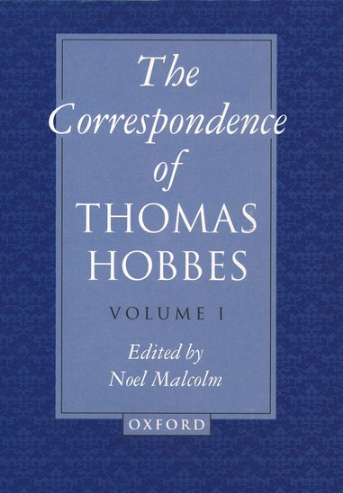According to John Aubrey, Thomas Hobbes‘s mother went into labour in Malmesbury on Good Friday 1588 ‘upon the fright of the invasion of the Spaniards’ and thereupon gave birth to twins: the philosopher and fear.[1. John Aubrey, Brief lives, chiefly of contemporaries, set down by John Aubrey, between the years 1669 and 1696, ed. A. Clark, 2 vols (1898), p. 327. This reactionary birth seems a little early, even allowing for the difference in calendar date. Good Friday fell on 5/15 April that year; the Spanish fleet did not leave the port of Lisbon for another month.] Despite this alleged inauspicious start, Hobbes, whose correspondence catalogue is the latest to be released in EMLO, lived for more than nine decades. His surviving letters, edited by Noel Malcolm and published in 1994 by Oxford University Press as volumes VI and VII within the Clarendon Edition of the Works of Thomas Hobbes,[2. The Correspondence of Thomas Hobbes, ed. Noel Malcolm, 2 vols, The Clarendon Edition of the Works of Thomas Hobbes (Oxford: Oxford University Press, 1994), vol. 1, 1622–1659, and vol. 2, 1660–1679.] do not — as Malcolm points out — make up as large a corpus of correspondence as might be expected when compared to the numbers of letters left to historians by many of his contemporaries: the 211 letters brought together in these volumes have been supplemented by just a handful in the last two decades,[3. For which see Noel Malcolm and Mikko Tolonen, ‘The Correspondence of Thomas Hobbes: Some New Items’, in The Historical Journal, 51, 2, (2008), pp. 481–95.] and of this number approximately a third are by Hobbes himself.[4. For a discussion on and explain of this, including the possibility that Hobbes burnt many papers in his own hand, see Malcolm, Correspondence, vol. 1, ‘General Introduction’, esp. pp. xxi–xxvi.]  Yet gems aplenty are to be found within the correspondence, and users are encouraged either to take advantage of the subscriptions held by their institutional libraries to follow the links from each record in EMLO to the texts that are mounted in OSEO, or to locate the hard-copy volumes. The metadata for this correspondence were supplied to EMLO by Oxford Scholarly Editions Online [OSEO], and EMLO is delighted to be working increasingly in this phase of funding with OSEO to showcase the correspondences of such key figures as Philip Sidney (from Roger Kuin’s edition), Elizabeth Stuart, Queen of Bohemia (from Nadine Akkerman’s edition), and Elias Ashmole (with metadata teased by EMLO from C. H. Josten’s edition of Ashmole’s own Autobiographical and Historical Notes).
Yet gems aplenty are to be found within the correspondence, and users are encouraged either to take advantage of the subscriptions held by their institutional libraries to follow the links from each record in EMLO to the texts that are mounted in OSEO, or to locate the hard-copy volumes. The metadata for this correspondence were supplied to EMLO by Oxford Scholarly Editions Online [OSEO], and EMLO is delighted to be working increasingly in this phase of funding with OSEO to showcase the correspondences of such key figures as Philip Sidney (from Roger Kuin’s edition), Elizabeth Stuart, Queen of Bohemia (from Nadine Akkerman’s edition), and Elias Ashmole (with metadata teased by EMLO from C. H. Josten’s edition of Ashmole’s own Autobiographical and Historical Notes).
Much of Hobbes’s life is known from the compilation of biographical material provided by his friend Aubrey. The two men had a teacher in common: the clergyman Richard Latimer (who, as vicar of Westport in Wiltshire, provided Hobbes with a grounding in Latin and Greek, and subsequently, some three decades later as rector of Leigh Delamere, played a key role in the early education of Aubrey). Malcolm points out in his entry on Hobbes in the Oxford Dictionary of National Biography that this connection was one reason for the younger man’s interest in and friendship with the author of Leviathan.[5. N. Malcolm, ‘Hobbes, Thomas (1588–1679), philosopher‘, Oxford Dictionary of National Biography (2004-09-23).] Hobbes’s surviving correspondence contributes significantly to what Aubrey was able to garner and, in addition to charting the epistolary conversations in which Hobbes was involved — including exchanges with Descartes courtesy of the agency of Mersenne — the letters offer invaluable insights into the philosopher’s personality.
In a letter to Gervase Clifton of 30 January 1635 Hobbes writes that his words will ‘haue the effect of a perspectiue glasse, wch shewes you not onely a towre afarre of in grosse, but also the battlements and windowes and other principall partes distinctly …’.[6. Malcolm, Correspondence, vol. i, letter 13, p. 25.] Users will find they do indeed offer a lens onto the life and work of a man who, again to quote Malcolm, is acknowledged increasingly as ‘a philosopher whose importance extends far beyond the realm of political theory — someone whose work in theology, metaphysics, science, history, and psychology entitles him to be described as one of the true founders of modernity in Western culture.'[7. Malcolm, ‘Hobbes, Thomas (1588–1679), philosopher’, ODNB.]
